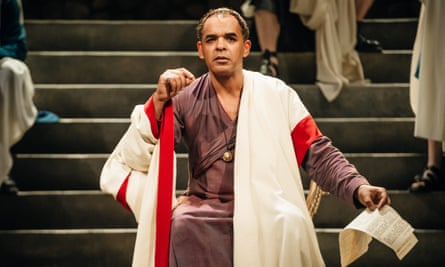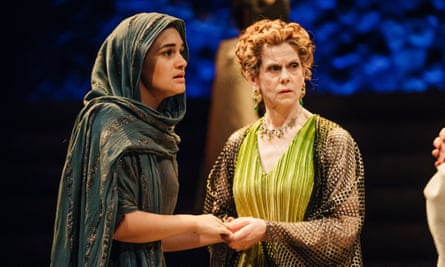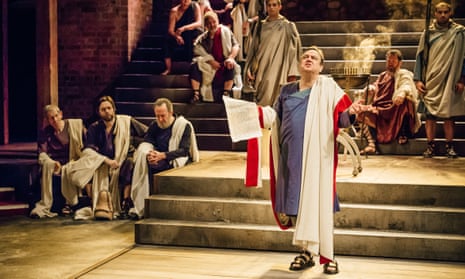Rome wasn’t built in a day. Nonetheless Mike Poulton has adapted Robert Harris’s compelling trio of novels about Cicero into a massive two-part, seven-hour play that provides both an intriguing character study and a demonstration of politics in action. In Gregory Doran’s production, it becomes one of the finest achievements of the Royal Shakespeare Company in recent years.
Poulton makes no attempt to compress the entirety of Harris’s trilogy. Forsaking much of the first book, which traces Cicero’s rise to fame as a lawyer after his exposure of a corrupt provincial governor, Poulton focuses on his attempt to preserve the republic’s integrity. In the first part, Conspirator, we see the consular Cicero successfully thwarting Catiline’s rebellion and fighting for his life against Clodius’s enmity. In the second part, Dictator, Cicero struggles with less success against the autocratic values of Julius Caesar, Mark Antony and the boyish Octavian. Poulton has, in fact, seized on the theme that runs through Harris’s three books: Cicero’s unyielding belief in the rule of law.
Obviously, part of the fascination lies in spotting parallels between Roman politics and the present. Sometimes these are overt, as when Doran’s production turns the self-glorifying Pompey (Christopher Saul) into an orange-complexioned figure buoyed up by his own bombast. When, after the assassination of Caesar that changes the course of history, the dithering Brutus reveals there is no plan B, it is also hard not to think of today’s headlines. But what keeps us engrossed is the spectacle of Roman history made manifest.

Even if the second part, charting Cicero’s post-consular decline and periodic misjudgments, is marginally less thrilling than the first, we are hooked by the sight of an imperfect democracy turning into a tyranny and by the subordination of law to individual will.
Cicero himself, whose story is told by his secretary, Tiro, is always at the centre of the action, and is beautifully acted by Richard McCabe in a career-defining performance. McCabe follows the arc of the script in allowing us to see Cicero’s virtues: his oratorical skill, his devotion to Rome, his philosophical nature. But McCabe also brings out Cicero’s weaknesses. He never ceases to remind everyone that he has triumphed over his humble origins. Cicero’s silky irony also conceals a vanity that allows him to remark: “Stupid people tend to vote for stupid people.” Above all, McCabe suggests that, for all Cicero’s devotion to his daughter, he was more concerned with his intellectual legacy than with the preservation of his marriage to Terentia. McCabe takes a legendary figure and makes him fallibly human.
But there is a glittering array of performances. Joseph Kloska as Tiro becomes a friendly guide to the intricacies of Roman politics. Joe Dixon doubles effectively as the feral Cataline and the almost equally uncontrollable Mark Antony. Peter de Jersey’s Julius Caesar is always the smiler with the knife under the cloak, even if the weapon is finally turned against himself. Oliver Johnstone brings out the watchful danger of the youthful Octavian. And, although these are male-dominated plays, Siobhan Redmond excellently shows the hidden steel of Terentia, while Eloise Secker, as both Clodia and Fulvia, suggests that power-battles are not confined to the Forum and that vengeful rage is not the property of any particular gender.

Doran marshals events with exemplary speed and clarity, against an Anthony Ward set in which a pair of eyes peer out from a mottled mosaic as if gazing down on us from ancient Rome. Paul Englishby’s music blends thunderous percussion with more delicate string flavours. But this a tremendous show that avoids Hollywooden Cecil B DeMillery and verbal tushery to take us to the heart of ancient Rome. The highest compliment I can pay it is that, after seven hours in the theatre, I felt exhilarated rather than exhausted.

Comments (…)
Sign in or create your Guardian account to join the discussion